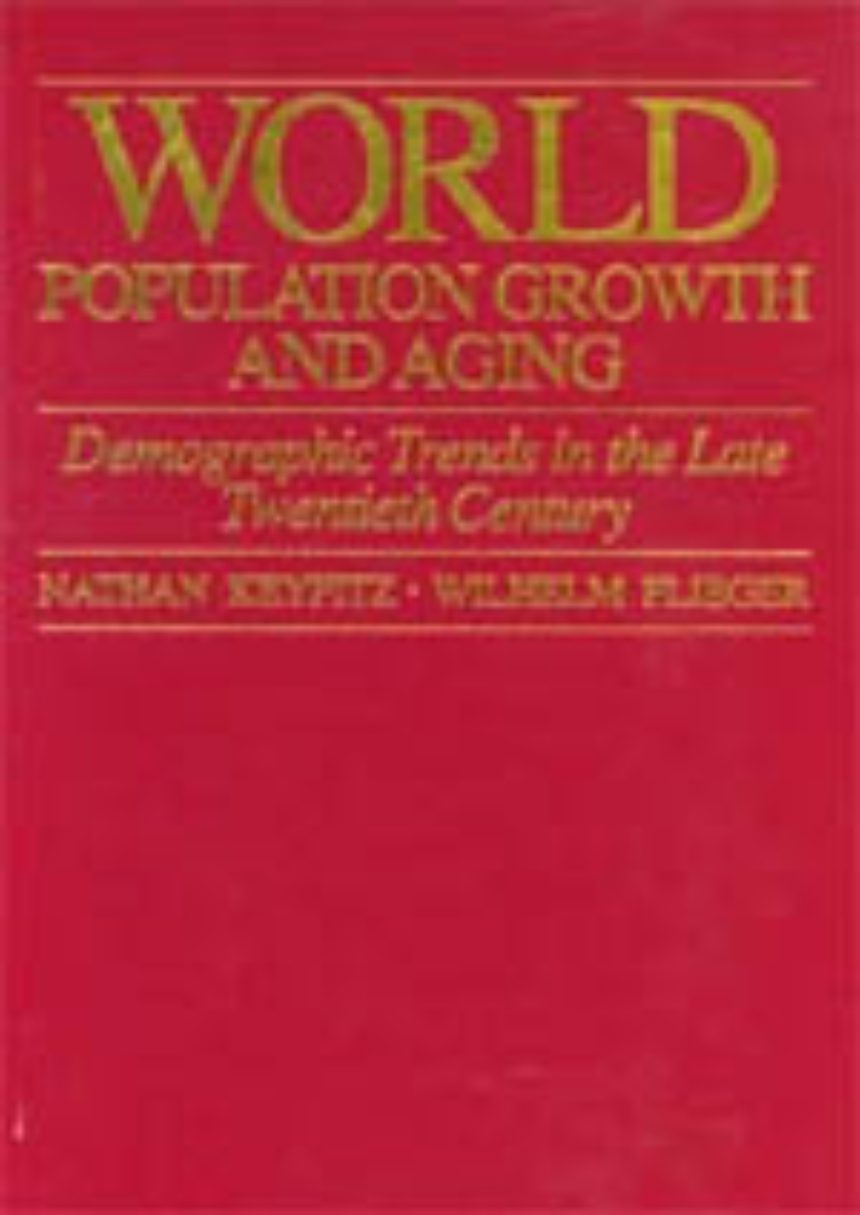World Population Growth and Aging
Demographic Trends in the Late Twentieth Century
Drawing data from official sources in 60 countries, as well as from the United Nations and the World Bank, this compendium of statistical information on population, fertility, and mortality treats every one of the UN-recognized countries in at least summary form. With data from 1950 onward and projections through 2020, this volume extends the dataset of Nathan Keyfitz and Wilhelm Flieger’s landmark work, World Population: An Analysis of Vital Data (1968), with virtually no overlap.
All the life tables, standardized rates, and projections have been generated by uniform methods to ensure easy comparison among countries. More than 800 charts provide a foundation for analyzing the radical demographic changes now taking place: the historic lows of fertility in Germany and other industrial countries, Africa’s persistently high fertility, and the worldwide extension of life expectancy. The product of cautious and painstaking labor, this work promises to be an important resource for further demographic research as well as a valuable comparative resource for studies of the status of global social welfare and the environment.
All the life tables, standardized rates, and projections have been generated by uniform methods to ensure easy comparison among countries. More than 800 charts provide a foundation for analyzing the radical demographic changes now taking place: the historic lows of fertility in Germany and other industrial countries, Africa’s persistently high fertility, and the worldwide extension of life expectancy. The product of cautious and painstaking labor, this work promises to be an important resource for further demographic research as well as a valuable comparative resource for studies of the status of global social welfare and the environment.
616 pages | 800 line drawings, graphs, and maps | 8-1/2 x 11 | © 1991
Economics and Business: Economics--Development, Growth, Planning, Economics--International and Comparative
Geography: Social and Political Geography
Sociology: Demography and Human Ecology
Table of Contents
Introduction
Demographic Data and Parameters
1. Tabulations Based on United Nations Data and Estimates
a. Origin and Quality of UN Data and Estimates
b. Geographical Coverage
c. Substantive Coverage
d. Definition of Variables
2. Detailed Country Tabulations
a. Purpose
b. Populations Covered
c. Data Origin and Quality
d. A Comparison of Detailed Country Tabulations with UN-based Tabulations
e. Substantive Coverage
3. Summary Table
a. Purpose and Arrangement
b. Coverage
c. Definition of Variables
4. Tabulation Guide
Tabular Materials
Part I: Summary Table
Part II: Tabulations Based on United Nations Data and Estimates
Part III: Detailed Country Tabulations
Appendixes
A. Country/Territory Groupings Defined
B. Land Areas and Estimated 1985 Populations of Countries and Territories Not Separately Listed among UN-based Tabulations
C. Data—Sources, Adjustments, Qualifications
D. VANPRO-A Demographic Software Package
Cooperating National Statistical Agencies and Correspondents
Region-Country-Territory Index
Demographic Data and Parameters
1. Tabulations Based on United Nations Data and Estimates
a. Origin and Quality of UN Data and Estimates
b. Geographical Coverage
c. Substantive Coverage
d. Definition of Variables
2. Detailed Country Tabulations
a. Purpose
b. Populations Covered
c. Data Origin and Quality
d. A Comparison of Detailed Country Tabulations with UN-based Tabulations
e. Substantive Coverage
3. Summary Table
a. Purpose and Arrangement
b. Coverage
c. Definition of Variables
4. Tabulation Guide
Tabular Materials
Part I: Summary Table
Part II: Tabulations Based on United Nations Data and Estimates
Part III: Detailed Country Tabulations
Appendixes
A. Country/Territory Groupings Defined
B. Land Areas and Estimated 1985 Populations of Countries and Territories Not Separately Listed among UN-based Tabulations
C. Data—Sources, Adjustments, Qualifications
D. VANPRO-A Demographic Software Package
Cooperating National Statistical Agencies and Correspondents
Region-Country-Territory Index
